Our contributor Sarah Kay learns about the relationship between mentor and apprentice…
Five years ago, tired of expensive rents and constant noise, delayed trains and endless commutes, I decided to move to a small village in the Upper Normandy region of France where neighbours all know each other and the cheese is definitely better than what I could experience elsewhere. Sure, it was a terrible decision as I travel a lot and was further away from airports, but I had an amazing bakery, a great apartment – then last year, something happened: a tattoo shop opened. Curious, I went in in the first days. Located two doors away from me, I had never seen a tattoo shop that far away from the big cities that had, according to their page, a serious quality to them.
I had just returned from NYC and asked MVDV, whom I barely knew at the time, to tattoo a slice of blueberry pie on me. His enthusiasm and really funny disposition made me immediately at ease, and the result is incredible. Having them as neighbours, I had the opportunity to know them better – and to continue booking appointments even as borders remain closed due to COVID-19. It’s an incredible luxury. I took time out of the apprentice, Trixie Lunie’s busy day to ask her questions about the tattoo world and her decision to enter it, and asked her mentor, MVDV, how he sees it. The keyword? Humility.
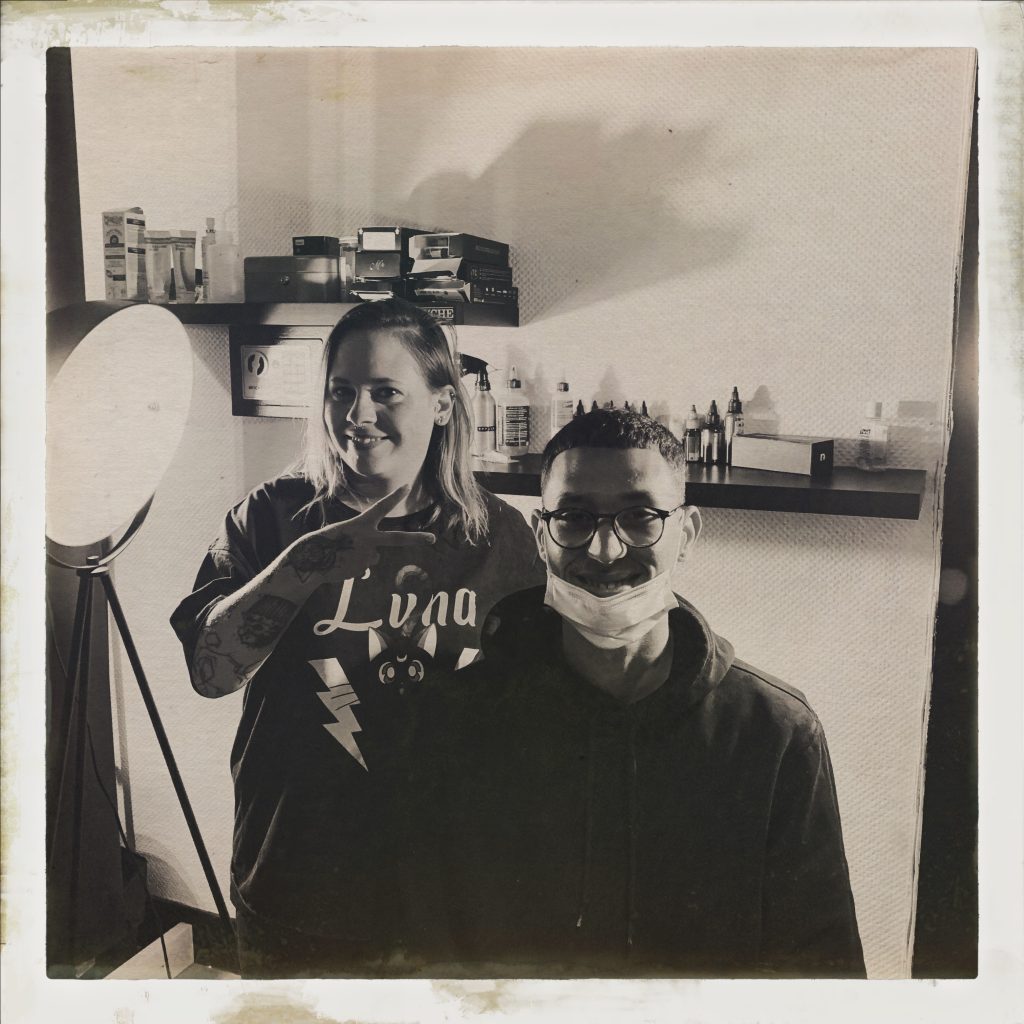
How long have you been an apprentice for now? A little over nine months.
How many tattoos have you done on actual people, including yourself? Over thirty I think on people, and five on myself.
How long have you wanted to be a tattoo artist for? For about 10 years. It wasn’t always possible, since a tattoo apprenticeship is unpaid, but now I can do it because I have a partner supporting me and after having worked for many years before I’m entitled to unemployment benefits.
Were you drawing before or were enrolled into any form of art curriculum? No, I’m an autodidact. I’ve been drawing since I was capable of holding a pencil though, I had been watching my dad tattoo – he was a tattooer himself. He was more of a scratcher: he would tattoo from home, mostly his friends, local people, I still got to take a look at how he worked, and we would attend conventions together. As clients, not professionals! (laughs) Let it be clear that I’m not into his style, but he never was told or taught how, never had a strong foundation, and that’s what I wanted and needed. I wanted a reputable studio where I would be shown and told strictly what to do and how to learn to be the best tattooer I can be.
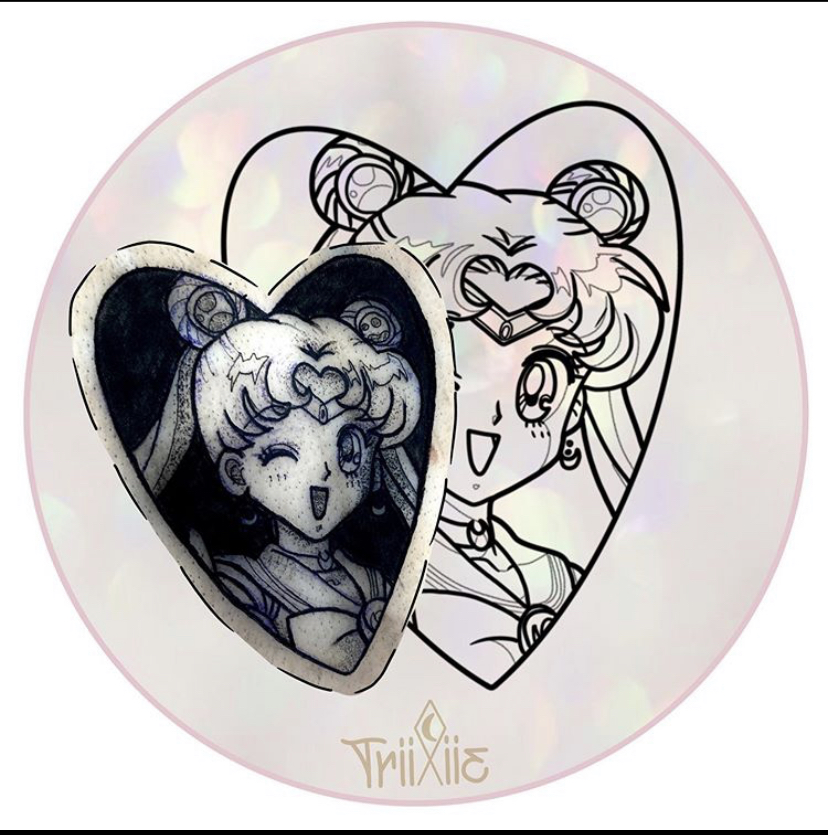
How long did it take for you to find an apprenticeship? A long time! It’s really hard. There are a lot of requests and very few spots. It took me about a year to find this one. I found them through social media, I liked the work being performed, people seemed satisfied; I just didn’t want to go just by reputation. A reputation can take ages to be formed, but it can fall apart so quickly. I wanted something solid. Now I truly believe I have what I wanted, with a great mentor.
So who is your mentor? Is it Casper (the owner) or MVDV (the tattooer)? Casper is my Jedi Master, and I am MVDV’s padawan. We’ve only known each other since February! It’s going very well. I’m learning a lot, because my preference is manga and anime, and he works mostly in realism, so that was definitely a learning curve. He’s making me draw a lot, I’m starting to tattoo on fake skin, and he’s always behind me, telling me what I can improve. He gauges when I’m ready to do something, which may not always be when I feel ready. They’re making me draw some flash sheets right now so I can get used to creating designs.
I saw that you posted on your Instagram about the tattoo me too situation. How do you feel about that and how do you see your place as a young female up and coming artist? I know that in this studio I will never face any form of discrimination whatsoever. I think elsewhere however, womxn can be under-respected because they are still believed to only be there to draw cutesy hearts or butterflies; I follow a lot of female artists that do, and do so in very different styles and who completely own it. And there’s nothing wrong with being girly. Womxn can be good at everything. There’s enough room for everybody now, and now there are conventions for female tattoo artists too, so I’m entering the business at the right time. A few years ago, it may have been different.
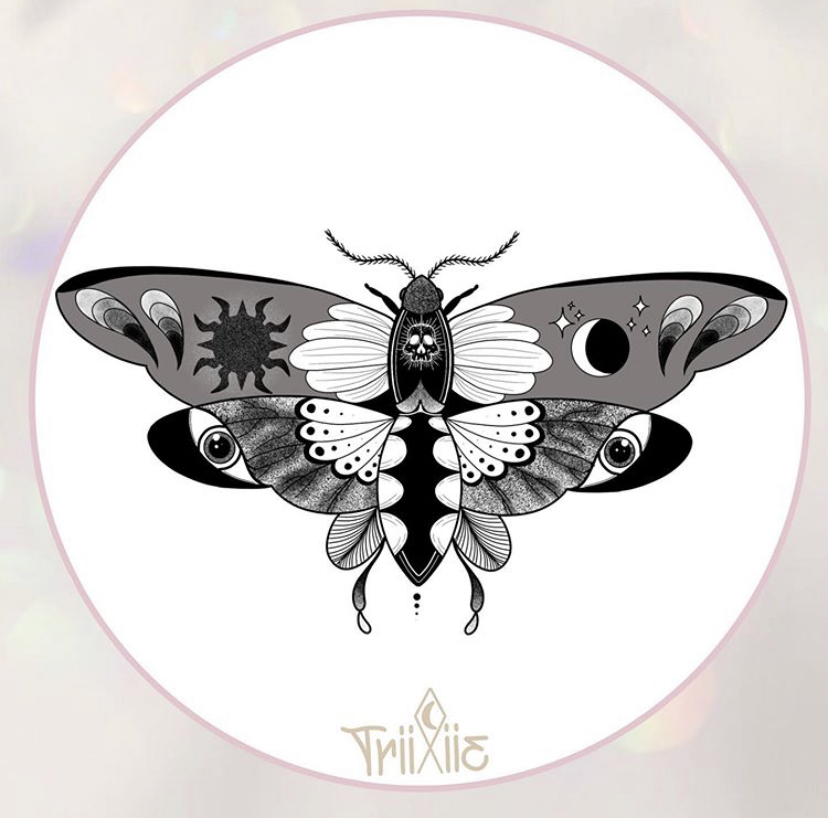
Who is inspiring you right now? Charline Puth, who has a private studio in Paris, I’m getting tattooed at Getcha Club by Charlotte E San in Lille. I love all this Japanese inspired art world. At the end of the day though, we’re all here to do the best job possible for the client and their idea of the design, so as Casper told me when I started, we need to be able to do everything. Of course I’d like to specialise in manga-inspired work and work on really colourful designs, and there is an audience for that, but I must be capable of performing in any style as well.
When it comes to the tattooer-client relationship, what are the values that you hope to bring to the table as a solo artist? What matters to me is to have a very clean shop, that is inviting, really abide by strict rules of surgical hygiene with the equipment, and look my best as well, so people can trust me. Then I want to establish a friendly atmosphere, regardless of the mood I’m in, just like in any other workplace, a lot of humour so people can feel comfortable, and be really respectful of their bodies and of their boundaries.
How do you deal with someone who is anxious – because it’s their first tattoo, a sensitive body part, because of the pain, how do you put them at ease? You talk to them a lot, you offer them a cup of coffee, you ask them if they had something to eat, you take your time. You make sure to have a lot of time so the person can take as many breaks as they need to, I know MVDV is really cautious on the first lines to see how the person reacts and how he can talk them through what’s happening.
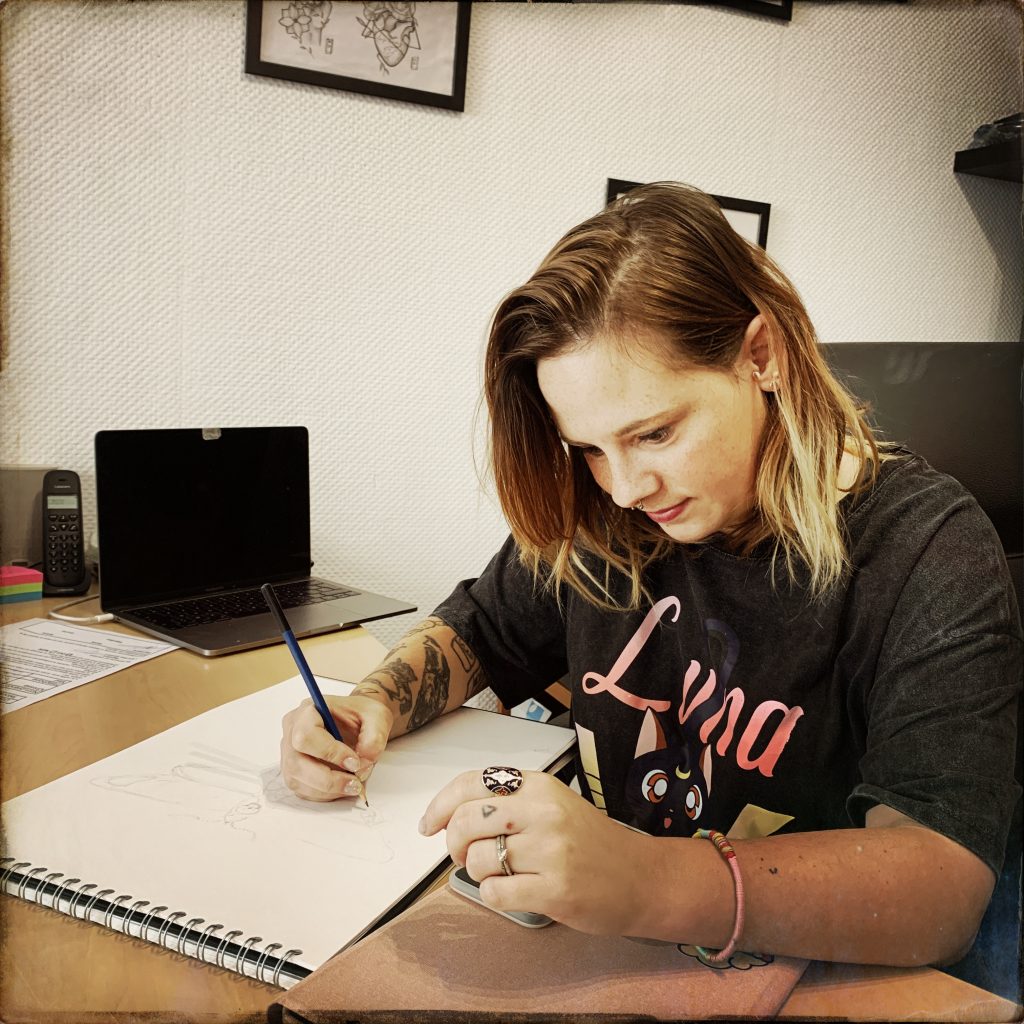
Do you think it’s a possibility that a womxn would enter the shop and would rather have you tattoo her than MVDV? That’s a total possibility. It depends on the body part. I would do it, if this is a person that would rather have a womxn do it, especially with everything that’s going on. With MVDV though, he’s been working with some sensitive body parts as well and everything went smoothly; that’s his job, he’s used to it, he knows how to work it, and he would never post insensitive photos on Instagram afterwards, you see.
Do you think it’s harder to be a female apprentice with a male mentor? You need to have a strong personality in this business anyway, because there are stupid people everywhere. You need to stand your ground and go for it once you found the place where you’re comfortable.
About competition? Of course there’s a lot of competition, but as I said there is room for everyone and everyone can carve their own space.
How do you see your future in this shop? I’ll be 80 and still tattooing on fake skin. (laughs)
Your biggest fear right now about tattooing someone? I recently tattooed one of my good friends and she was really stressed out and it was contagious, but I managed to keep a steady hand and I had really prepared for it.
This fear that you’re permanently altering someone’s body and you’re afraid to screw up, that never fully goes away, right? No, it doesn’t. With experience, you gain perspective. A tattooer will always have something to learn. If someone goes ahead and tells you they have nothing left to learn and know everything, I don’t think they got the point. They no longer evolve. Techniques change. Methods change. Equipment changes. Designs change.
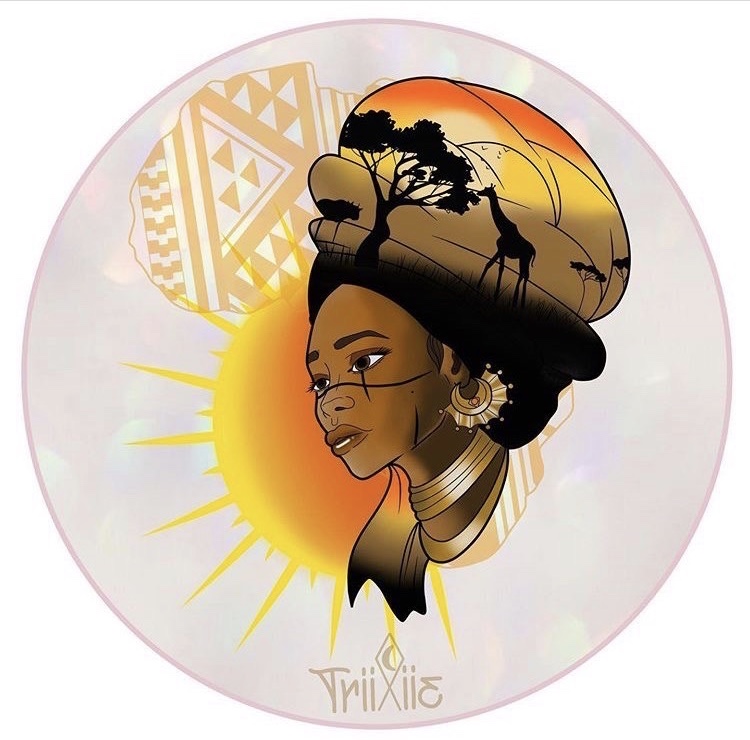
Now that tattooing has become so prevalent in the last decade, you see “tattoo schools” pop up, and people entering the fold with art degrees. What do you think about it and how it changes the nature of tattooing? I believe in apprenticeships, but it would be helpful if it had a real legal status. We deal with it, and I do, but it would be great if it could be recognised as an apprenticeship just like any other profession. As for art, you may be a brilliant artist, that still won’t make you a good tattoo artist. Those are two different things. Nothing can replace a solid apprenticeship.
How long do you think your apprenticeship will last? My whole life! After a year and a half I think I will have a good foundation. Just the foundation. But I wouldn’t be a good artist then. I am going to start tattooing soon, because it comes with practice. The shop remains small and approachable, even though we’re starting to be booked quite solidly, but I wouldn’t want to be anywhere else. My two masters are extremely good, we have a great working relationship and they tell me if anything is wrong. They explain to me how to place order, how to manipulate equipment, hygiene requirements, but this is not a shop where they will only have me serve coffee and sweep up for a year, you know? They’re making me draw and work on fake skin every day.
A last word on womxn in the industry? That female tattoo artists are just as qualified as a male one, that some can run circles around others, that we’re not here to be a punchline. Things are changing really fast, hopefully for the better. And there also should be no objectification of heavily tattooed womxn either!
How long have you been tattooing for? It’s been nine years. Very happy with my evolution – I’m learning more about the craft every day. I was just doing my thing for five years and now I’m officially set up in a shop for four.
And now that you’re an apprentice’s mentor, how do you feel about it? It feels really strange because I don’t feel like I am in a position to be a mentor. I don’t feel I have what it takes yet to be a mentor. I don’t feel any seniority.
So how does the dynamic work? I can give her tips and pointers based on what I am capable of doing, but I still feel like mentorship has to be earned and being a mentor is something that carries with it a lot of responsibility. No one is really a mentor as we all learn something new every day. To be a mentor, for me, is the end-all-be-all of the work, it’s being in such a strong position of authority in the history of tattooing.
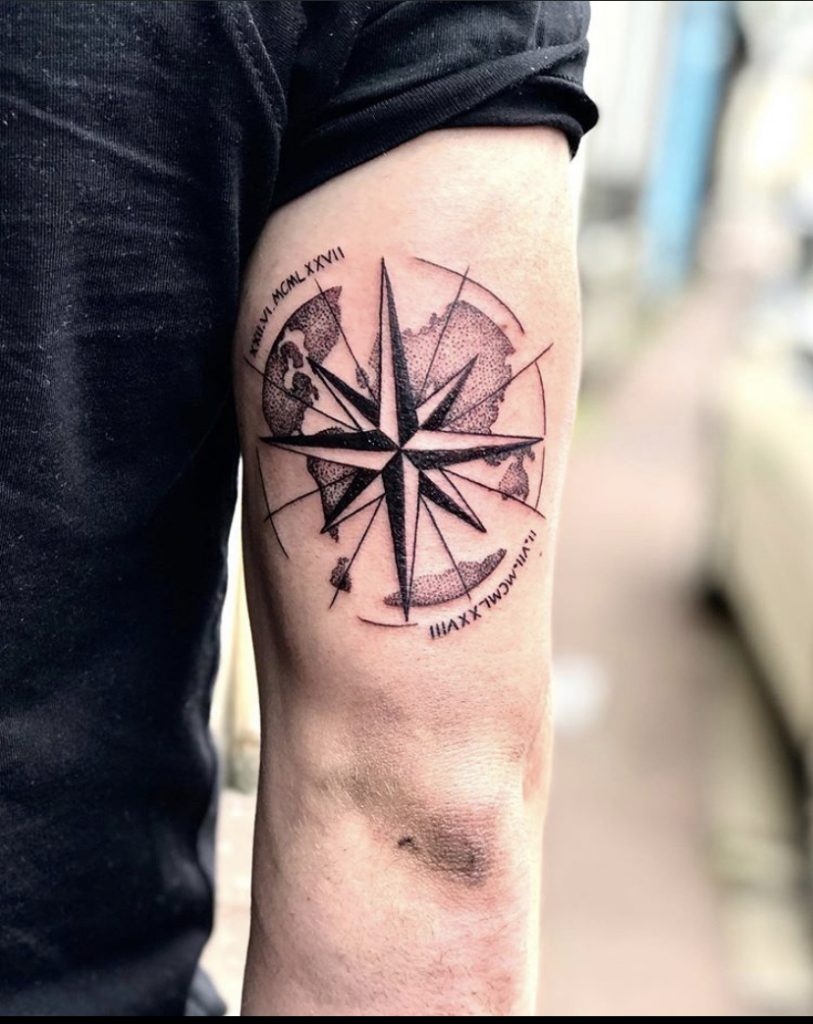
What has been the most challenging piece for you so far? It was a realistic lion that I just did this week! And it has taught me a lot about what I can do and how to best approach it.
How do you see Trixie debuting in this industry once her apprenticeship will be complete? I’m not necessarily apprehensive, but just like I did have, it necessitates a lot of rigor and a lot of perseverance to make it. For those of us who had to learn everything on the go, it’s even harder, so it requires a lot of personal commitment.
What does it mean to you to train a new female artist? There are so many womxn out there who are doing such an amazing job, discrimination makes absolutely no sense. Womxn have their place in this industry the way they do everywhere else.

What do you think of this reckoning right now in the tattoo industry about sexual misconduct? Those are horrible people who would be horrible in any other job as well but abusing their position. We are in a profession where the human body is literally our canvas, our workplace, so men who are unable to behave with respect in this job have absolutely no place here.
Do you feel a specific type of responsibility when you tattoo a sensitive body part? A place that she wouldn’t like, but she wants to look at and see something beautiful instead? It’s the case for everyone, I feel, that they come to tattooing to change the way their body is before, and turn it into art. And it’s entirely my responsibility to do the best possible job I can so they can look at it years onwards and still love it. It’s true that if they’re having a difficult time because of body image, we have the opportunity to work with the client to make something really significant. Any art you work on is for life, and you have a duty as an artist to make it as perfect as possible. There’s no way to half-ass it. Whether it’s your specialty or not, if you accept to do it, the responsibility is there. I think about this all the time: it’s permanent body altering.
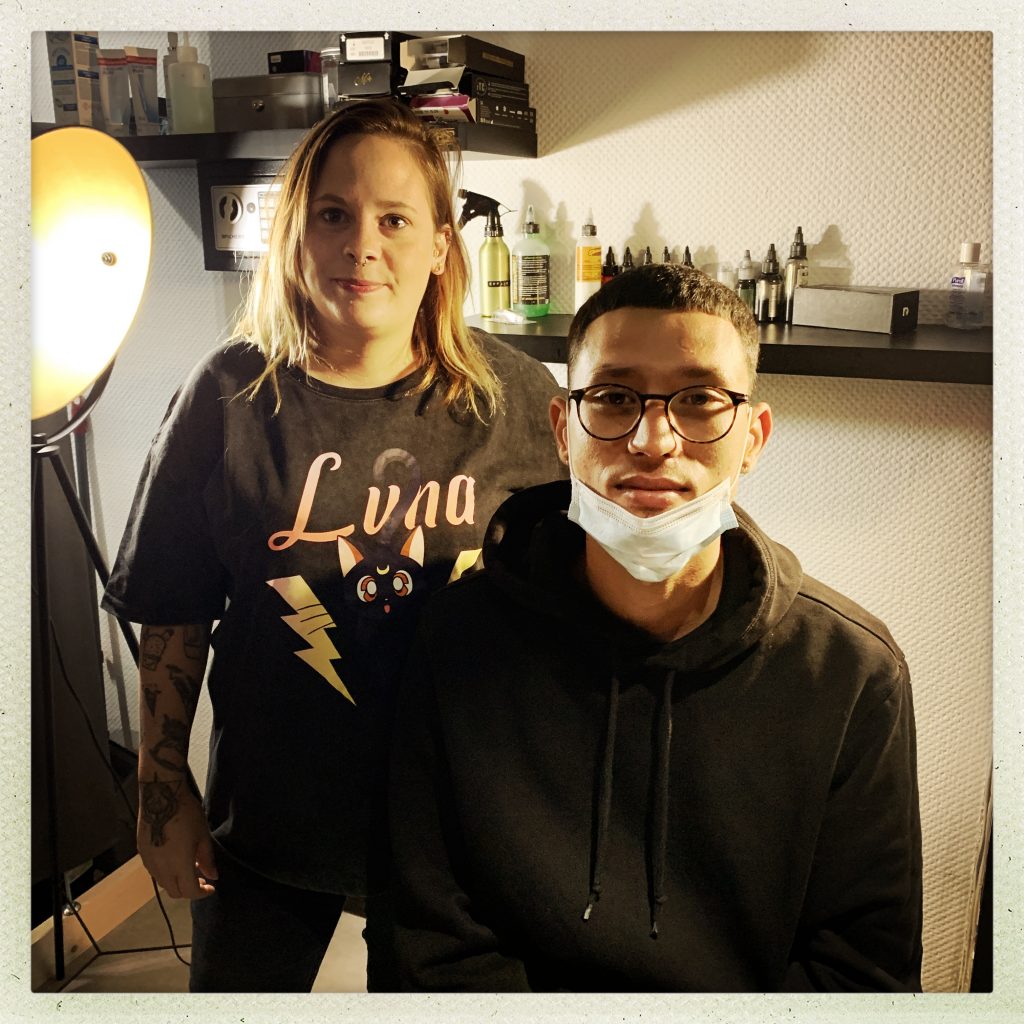
And that’s really something you want to transmit to your apprentice. Yes: the love of working with people, the love to create; and to me this is when you know someone is really into tattooing and has the potential to be a really good tattooer, it’s when they take pleasure in the challenge of creating something special. Going to work is not a chore. The tattooer-client relationship is an exceptional one. And being talented is something you have to constantly perfect, constantly improve.
The piece that makes you the most proud? I recently worked on a UFO, and I really loved it. I had added it to a flash sheet and I never thought someone would pick it; it’s something that is really dear to me, UFO and aliens, and that was really just something that came out of my head. This person really crushed on it and loved it, and I was just so happy to be able to do that piece. I thought it would be a little too “out there” for people, and no, it found its client! And that was wonderful for me.
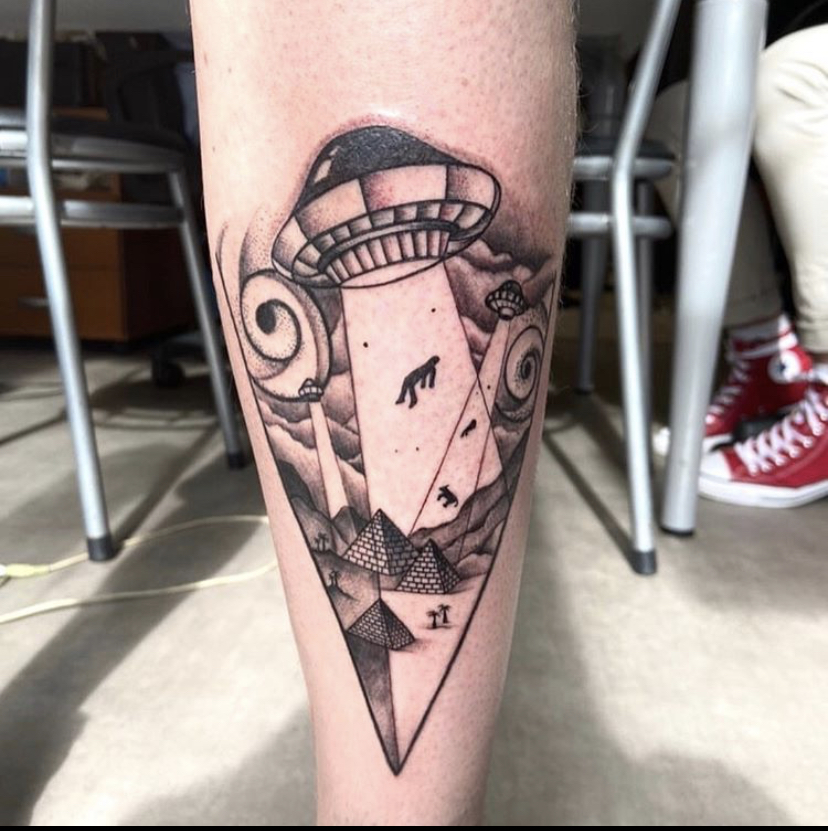
What’s the future like for you? I’m not worried about clients coming in, but I know I have to keep on learning, evolving, meeting new people, working on my craft, because you can become irrelevant real quick, there are new people coming out every day who just blow everything out the water. That’s something I learned immediately, so I’m just really looking forward to being in a job where I have to keep on learning every day. And if I can travel with this, learning other techniques, histories, legacies, that would be ideal. I had no mentor personally – when I arrived at Casper’s, they showed me the technical aspect of this, how to pose a stencil, how to best see a placement, and for that I’ll forever be grateful. But I don’t consider myself “arrived” or anything like that. I have a team that is family for me, and being a little orphan boy, having found them matters so much to me.
Both Trixie and MVDV are working at Casper S.O. Ink, Chaumont en Vexin, France.
Sarah Kay is a very, very tattooed international human rights lawyer living between Paris and New York. Originally from Belfast, Northern Ireland, Sarah has kept its taste for cold rain and the rewards that come from sitting still under pressure. You’ll probably find her in London drinking wine.